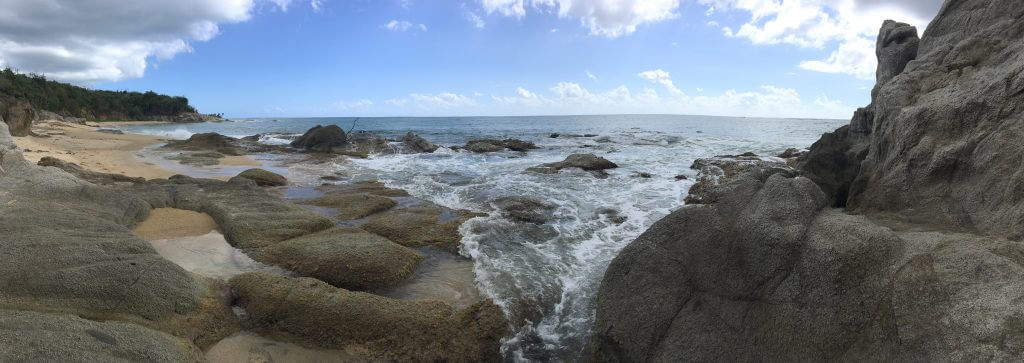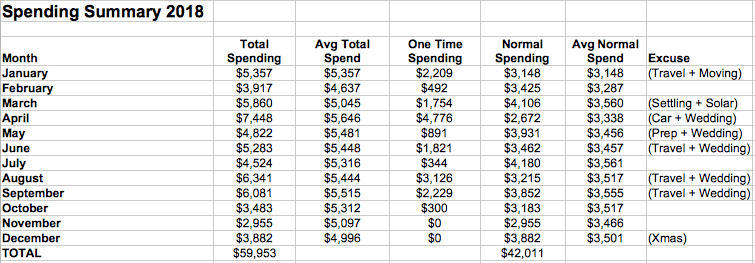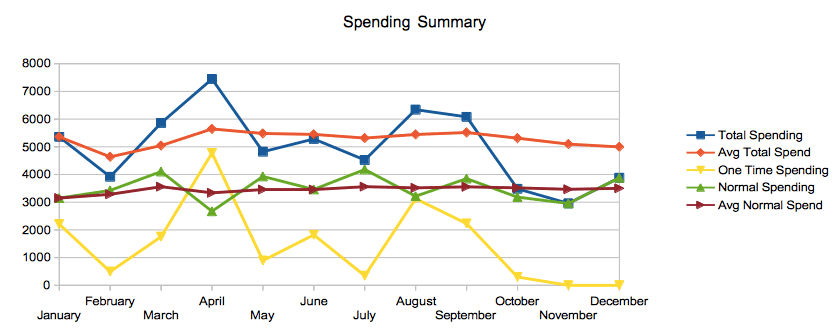Could Be Worse…
...could be raining. In fact, we all made it through 2018 so congrats to all of us, we're still on the right side of the dirt. But after a full year of spending our retirement savings, and with the stock market in the tank, we're really Knee Deep In It now! As we said in this post from the half-way point in the year, good times are free, but everything else costs money.

So here we are with an updated budget check to close out 2018. At the risk of repeating myself (which I do it a lot), spending is the number one reason that retirement plans either work or fail. Your retirement plan either gives you enough cash for a long happy life, or you run out of money and have to depend on the kindness of others (or the government) to survive. That sounds a bit dark, but it's true!
We've talked about our spending plan as a variable drawdown, not a consistent X dollars every year. It's the only practical solution in my mind. If things are going great financially, we can spend a bit more and enjoy (while noting that it won't always be that good). But if times are tight, then we plan to cut back a bit. I'm hopeful our spending in 2019 will be measurably lower than in 2018, and it should be because we're not buying a car, we don't have to purchase a solar backup system, and we're not budgeting in a wedding or a move.
The typical retirement spending approach is to calculate a fixed annual spending allowance and then adjust it for inflation each year. Your spending power and lifestyle stays the same because it's locked to inflation. It's an easier thing to calculate, but I find it less practical. Our plan uses a couple of different software tools to see what we can comfortably get away with each year. An important point is that we are spending less money in the early years while we are entertained by the sheer adventure of it all. We don't have or need (or even want) somebody serving us piña coladas, while sitting under an umbrella on a beach that's raked clean around chairs all lined up like dominoes! But as we age, we expect we'll need better healthcare and maybe want a little more luxury. Nothing is known, but that's what we think, and that may have us living somewhere else in the distant future. But since that lifestyle will cost more, we need to spend a little less now.
All of this is driven by the power of compounding, which I described in the post from 6 months ago, so I won't repeat it here. But it's very important to watch the spending in the first several years of retirement because time can either work for you, or very much against you when it comes to compounding.
We budgeted about $3700/month in 2018 for our basic expenses. This covers our rent, electric, water, internet, cellphone, Netflix, food, auto fuel and maintenance, insurance, and pet expenses. Those are all pretty much the same every year. If things get really tight, we could trim some of them but I consider them pretty much as fixed costs. Clearly some people here spend a lot more than that, but others get by on much less. I don't know where we sit exactly but I'm guessing it's somewhere in the middle of the pack.
Next we budgeted for what we called one-time expenses, things that we knew about ahead of time. These included the car purchase, travel and other expenses for our son's wedding, and some of what we spent to get settled here in Vieques (household items, mostly). These expenses added up to quite a bit but again they don't recur, or if they do (like for travel) they are in the budget.
Finally, we tried to budget for the unknown. This is more difficult because it's unknown, or certainly much less known. Our solar backup system fell into this category. We knew that the power was unreliable in the islands, but we didn't realize it was going to be so bad for so long. So we responded by spending money on the problem. Also, our hurricane prep cost us a few hundred bucks and we could have predicted that, but we didn't. Fortunately, we can re-use much of that food next year. We are using up the items that expire sooner and will restock each year, but we won't have to replace the entire stash. We bought bikes to get around, which we probably didn't really budget for. We also had to buy an island cellphone because our carrier bailed out of this island after the storm (in spite of their assurances, I'm not sure they had much of a presence before the storm either). We also had some car rental fees when the bikes couldn't do the job (this was before we bought our car). All this unpredictable stuff is why we put some extra money in the budget. It's important to not get surprised by life's happenings.
So, through it all, how did we do? Let's take a look.

Because spending month to month isn't very consistent, I put in the averages columns to give a more accurate picture. Even though we want to see month-to-month trends, what really matters is the annual spend, so averages are useful. Earlier in the year we had many one-time expenses (non-recurring). They fell off at the end of the year once we settled in. Also near the end of the year I quit blaming some expenses as one-time, Xmas shopping for example, or even purchasing household items. It's not a one time expense, we do it every year. So I was more critical about properly labeling the expenses near the end of the year.
As described in the earlier post, in January we flew from Roatán, Honduras to Vieques, Puerto Rico. Almost right away we bought the bikes to get around until we could find a decent island car. In February, we had some small costs to get moved in and settled in the house. The house we are renting was furnished and stocked, but there are always things you need. In March, we were still buying some of those household items and that's also when we bought the solar backup power system that we described here and here. It cost us over $1000 but has been worth every penny to us. Note that as of December (15 months after the hurricane), the island is finally hooked up to Puerto Rico mainland power once again. It was almost magic how fast it happened once FEMA said they were done buying diesel fuel for the island generators! It should be noted though, that this is no panacea - the power went off again this morning as I write this. It was a brief outage, but it's a reminder that power is always sketchy in the islands.
In April, we bought our island car, which was a big expense, but necessary. That's also when the wedding expenses started coming in, making April a very expensive month. May was for hurricane prep and also had wedding expenses which continued into June.
July was lighter because the upfront wedding expenses were paid, but August and September is when we traveled and spent more money. It was all budgeted and worth every penny!, but the numbers are relatively large compared to say February when we didn't have any special costs.
The last 3 months of the year were about what I expected. Expenses dropped back in the normal range and we felt less like drunken sailors on shore leave. 🙂

I get more out of graphs than tables, and not just because I like pretty colors. The visual representation makes trends easier to see. In this graph note the averages of "Total Spending" (orange line) and "Normal Spending" (red line) which subtracts off the non-recurring items. The total spending (blue) is quite varied with the big non-recurring items, but the normal spending is more steady. I show the averages as I mentioned because month-to-month expenses can change a lot. The normal spending average fell into a very smooth line and the total spending average was a slowly decreasing number, both good signs. Finally, the yellow line, the non-recurring stuff, fell off to zero at the end of the year.
So normal spending easily met our budgeted amount; the average settled in to $3500/mo, $200 under budget. But it shouldn't be a surprise that we can expect the expected! And as for the non-recurring expenses (which were mostly in the first half of the year) we spent about $3000 over what we'd budgeted for! There are two big peaks in the year, in April (car purchase) and Aug/Sep (wedding & travel) but both of these were in budget. I could look at and blame the bicycle purchases or the backup solar power, etc., but there were also many smaller purchases that added up over time. I don't really consider it a failure because honestly at the time, we didn't know what we didn't know. It seems to me that our budgeting diligence has paid off with both the normal spending and even the abnormal spending because even when we overspent, we learned from it.
And I will say in no way have we lived like misers, we simply are watching what we spend like any smart couple would, especially when investments are currently going in the wrong direction. We've embraced this challenge of not wasting money, and we talk about it enough to stay on the same page. In our previous life, it was always something we disliked even while we were doing it every month. How many sweaters does one guy need? Well, in Colorado, you need a few I'll admit that! But now more than ever, we just try to make sure we actually need the thing before buying it. Deb had an epiphany the other day, as she wondered aloud what she'd do if she won the lottery. I reminded her that you have to actually buy a lottery ticket to win the lottery, but that did not affect her story at all. She said if she won the lottery she would be doing exactly what we're doing now. And that's pretty cool, even though I said I'd buy a boat. And a truck to pull it.
But as for living like misers, we now own paddleboards, kayaks, snorkel gear, bicycles, fishing poles, and an island car to haul it all in, most of which we bought used. We go out and have fun every day, staying active in the process. We still don't own a TV though, which is probably a good thing, as we continue to keep an eye on not collecting too much stuff. We really don't want all that stuff and we certainly don't want to end up with too much stuff! Our initial reasoning on this was that we wanted to be able to move to some new place, then another place, and yet another place. Now, based a little on the cost, and more on the enormous hassle of moving, we feel it's better to have a home base and explore from there. But we don't need a lot of stuff to do that!
We hope this is useful for folks doing their own retirement planning. In my opinion, the details don't much matter but the process is important. I don't know how people relax in retirement without doing at least some basic budgeting and then checking it later to see how they've done.
Let us know your thoughts in the comments below, please!

TODAY'S SPECIAL: "Can't Buy Me Love" by The Beatles, "Tell me that you want the kind of things that money just can't buy" 🙂
